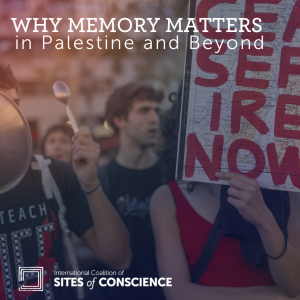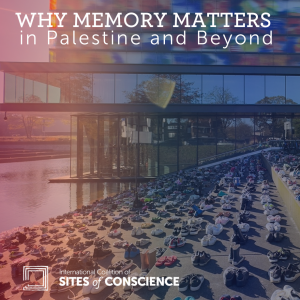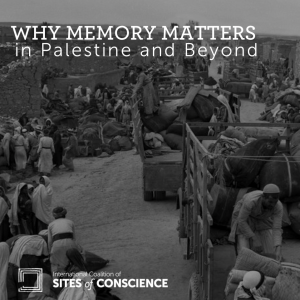Why Memory Matters in Palestine and Beyond
Welcome to Why Memory Matters In Palestine and Beyond, a series of global conversations facilitated by the International Coalition of Sites of Conscience (ICSC), and designed to help Sites of Conscience and their allies build a better understanding of what has led to the situation in Palestine today, encourage critical thinking and dialogue, and inspire action towards building more peaceful societies everywhere. The first part of Why Memory Matters in Palestine and Beyond includes six recorded conversations with guest speakers from academia and the fields of human rights and cultural heritage and will be available here in full on January 13, 2025. We will also host a three-day webinar taking place January 21st, 22nd and 23rd, 2025 that brings together Sites of Conscience members and partners who have faced related injustices in Bangladesh, South Africa, Northern Ireland and elsewhere.
Episodes

Friday Dec 27, 2024
Friday Dec 27, 2024
Coming soon - Episode 3 of Why Memory Matters in Palestine and Beyond.
In this third episode we are joined by, Professor Sahar Aziz, a distinguished professor of law, and Chancellor's Social Justice Scholar at Virgis Law School, and the founding director of the Center for Security, Race, and Rights, to discuss how racist stereotypes of Palestinians and Muslims are deployed to promote discriminatory policies and practices. We will also unpack connection between Islamophobia and anti Semitism and how the letter has been weaponized to defame those advocate for Palestinian rights.
Why Memory Matters in Palestine and Beyond is a production of the Global Initiative for Justice, Truth, and Reconciliation, which is a flagship program of the International Coalition of Sites of Conscience.
About the International Coalition of Sites of Conscience
The International Coalition of Sites of Conscience (ICSC) is a global network of historic sites and museums that empowers communities to share stories of past traumas to prevent conflicts and human rights abuses today. Through capacity building, networking opportunities and grants, ICSC equips its members – known as Sites of Conscience – to be champions of memory, truth and justice by providing their communities with transformative experiences that help them to counter false narratives, embrace more inclusive histories and advocate for just, equitable systems today. For more information, visit: www.sitesofconscience.org.
It was edited by Katie Marquette at MediaMarq. Learn more at www.sitesofconscience.org

Tuesday Dec 24, 2024
Tuesday Dec 24, 2024
Coming soon - Episode 2 of Why Memory Matters in Palestine and Beyond.
For our second conversation in this series, we welcome Professor Marianne Hirsch to discuss how the memorialization of traumatic events can be used to justify violence or reinforce prejudiced ideologies.
Additionally, it will examine the concept of connective memories, where different traumatic historical events intersect and coexist, fostering mutual understanding and solidarity.
Why Memory Matters in Palestine and Beyond is a production of the Global Initiative for Justice, Truth, and Reconciliation, which is a flagship program of the International Coalition of Sites of Conscience.
About the International Coalition of Sites of Conscience
The International Coalition of Sites of Conscience (ICSC) is a global network of historic sites and museums that empowers communities to share stories of past traumas to prevent conflicts and human rights abuses today. Through capacity building, networking opportunities and grants, ICSC equips its members – known as Sites of Conscience – to be champions of memory, truth and justice by providing their communities with transformative experiences that help them to counter false narratives, embrace more inclusive histories and advocate for just, equitable systems today. For more information, visit: www.sitesofconscience.org.
It was edited by Katie Marquette at MediaMarq. Learn more at www.sitesofconscience.org

Friday Dec 20, 2024
Friday Dec 20, 2024
Coming soon - Episode 1 of Why Memory Matters in Palestine and Beyond.
In this first episode, we'll be joined by Professor Ilan Pappe, an Israeli historian and professor of history at the College of Social Sciences and International Studies at the University of Exeter in the United Kingdom.
We will examine the historical context crucial for understanding the situation in Israel and Palestine, as well as the attempts to both de historicize these events and weaponize traumatic memories.
Why Memory Matters in Palestine and Beyond is a production of the Global Initiative for Justice, Truth, and Reconciliation, which is a flagship program of the International Coalition of Sites of Conscience.
About the International Coalition of Sites of Conscience
The International Coalition of Sites of Conscience (ICSC) is a global network of historic sites and museums that empowers communities to share stories of past traumas to prevent conflicts and human rights abuses today. Through capacity building, networking opportunities and grants, ICSC equips its members – known as Sites of Conscience – to be champions of memory, truth and justice by providing their communities with transformative experiences that help them to counter false narratives, embrace more inclusive histories and advocate for just, equitable systems today. For more information, visit: www.sitesofconscience.org.
It was edited by Katie Marquette at MediaMarq. Learn more at www.sitesofconscience.org

Why Memory Matters in Palestine and Beyond
It's currently January 2025, and well over a year has passed since October 7th, 2023, and the subsequent atrocities committed against Palestinians in Gaza and the West Bank.
The horrific nature of the violence is evident in numerous reports and statements, including those issued by the International Court of Justice, the United Nations, and Amnesty International, among many others. Why Memory Matters in Palestine and Beyond series features six recorded conversations available as both a podcast and a video series on IPCSC's YouTube channel with guest speakers from member sites, academia, human rights practitioners, and cultural heritage specialists.
It is intended to build a better understanding of what has led to today's atrocities in Palestine, encourage critical thinking, and inspire us all to take action towards building more peaceful societies everywhere.


